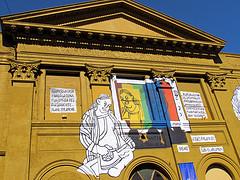 “(…) the subordinate social groups who suffer the most rigorous of the social and economic crisis have great difficulty in sustaining the education of new generations. A dangerous combination of problems of meaning (why go to school, to learn what is taught there, etc.) of performance problems (absenteeism, failure ena evaluations repetition, etc.) and supply problems (which makes it more attractive and “rational” an activity that involves an entry to go to school) ends up interrupting the education of the teenagers and young people (…) “(Tenti-FANFANI : 2003) analyzed the young people today, means to meet new social subjects more complex socio-class structure, they are also exposed to successive crises and shape a collective consciousness, to understand its dynamism, it is necessary to visualize the context in which is the framework which is stained by the contradictions of class, there can be inferred that their nature is fragmented, the underestimation of young people can not see his true power for change, as well as raises Reguillo Cruz: “(…) was easy to make young people both “scapegoats” in recipients of institutionalized violence, as in Figure dela formidable “enemy within” that transgresses through its disruptive practices as legitimate the social order (…) “(Reguillo CRUZ: 2000) a face of adverse situations specified and that have become” natural “can lead us as expressed Phillippe Meirieu a” (…) to sink into resignation , for fear of ourselves taken to the destruction of others and ourselves, we prefer to destroy all interest in the other. We well escape but in reality, we condemn ourselves to both la immobility: in rejecting the teacher, we reject the educable and educators, we give to education (…) “(Meirieu: 1998) therefore, I believe that to” escape trap “could begin lasnormas respect democratic way of organizing and managing our coexistence in the educational context would banish vital educational inequality where the poorest areas experiencing receive an impoverished education that prevents its retention in the system, or as expressly Blejmar Bernardo: “(…) Research Paper Excerpt from Neoliberalism, State and Education Case: Argentina to be carried out by Miriam Gualberto (anthropologist, University of Buenos Aires) in February 2010. Anthropologist. University of Buenos Aires.
“(…) the subordinate social groups who suffer the most rigorous of the social and economic crisis have great difficulty in sustaining the education of new generations. A dangerous combination of problems of meaning (why go to school, to learn what is taught there, etc.) of performance problems (absenteeism, failure ena evaluations repetition, etc.) and supply problems (which makes it more attractive and “rational” an activity that involves an entry to go to school) ends up interrupting the education of the teenagers and young people (…) “(Tenti-FANFANI : 2003) analyzed the young people today, means to meet new social subjects more complex socio-class structure, they are also exposed to successive crises and shape a collective consciousness, to understand its dynamism, it is necessary to visualize the context in which is the framework which is stained by the contradictions of class, there can be inferred that their nature is fragmented, the underestimation of young people can not see his true power for change, as well as raises Reguillo Cruz: “(…) was easy to make young people both “scapegoats” in recipients of institutionalized violence, as in Figure dela formidable “enemy within” that transgresses through its disruptive practices as legitimate the social order (…) “(Reguillo CRUZ: 2000) a face of adverse situations specified and that have become” natural “can lead us as expressed Phillippe Meirieu a” (…) to sink into resignation , for fear of ourselves taken to the destruction of others and ourselves, we prefer to destroy all interest in the other. We well escape but in reality, we condemn ourselves to both la immobility: in rejecting the teacher, we reject the educable and educators, we give to education (…) “(Meirieu: 1998) therefore, I believe that to” escape trap “could begin lasnormas respect democratic way of organizing and managing our coexistence in the educational context would banish vital educational inequality where the poorest areas experiencing receive an impoverished education that prevents its retention in the system, or as expressly Blejmar Bernardo: “(…) Research Paper Excerpt from Neoliberalism, State and Education Case: Argentina to be carried out by Miriam Gualberto (anthropologist, University of Buenos Aires) in February 2010. Anthropologist. University of Buenos Aires.